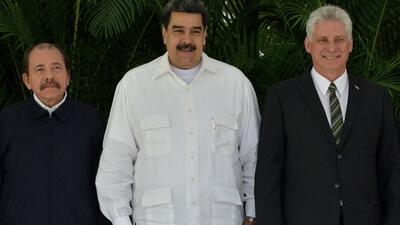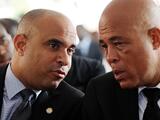Biden makes changes to Cuba and Venezuela policy: what impact could it have on the Florida vote?

The recent announcement of modest changes to the hardline “maximum pressure” campaign to pressure Cuba and Venezuela under Donald Trump have many analysts wondering if the Biden administration has given up on Florida, accepting that it is now a Republican state.
“In case you had any doubts that Florida is no longer a priority state for Democrats,” Miami-based pollster and Democrat campaign strategist, Fernand Amandi, wrote on Twitter after the Cuba and Venezuela policy news broke.
After months of silence on Cuba and Venezuela, the White House this month, in quickfire succession, issued some modest reversals of the hardline “maximum pressure” campaign under Donald Trump. But the measures were met with a barrage of protests from Republicans and received only lukewarm praise from some Democrats, threatening to further undermine Democrats in vote-rich South Florida, where Cuba and Venezuela politics plays an over-sized role in elections.
“Everyone is critical of his policy toward Venezuela and no one is in favor of what he is doing," said Ramon Muchacho, an exiled former Venezuelan mayor who now works as a political and financial analyst in Miami. "He is managing to alienate all those who are in favor of an opening toward Venezuela and those who are against an opening. He has totally alienated all sectors," he added.
In both cases, Cuba and Venezuela, there were elements of the policy changes that some could agree on, but these were canceled out by the inclusion of other changes that found little support in South Florida and left some scratching their heads for an explanation. Administration officials deny it had anything to do with an upcoming summit of heads of state from Latin America and the Caribbean in Los Angeles next week.
Mexico’s president Andres Manuel Lopez Obrador has threatened to boycott the summit if Cuba and Venezuela are not invited. But the Biden administration is loath to host any leader who was not democratically elected.
The pros and cons of Biden's Cuba and Venezuela policies
Regarding Cuba, Biden’s advisers announced that the White House was beefing up the U.S. embassy’s consular section in Havana to be able to process more visas for Cubans to be reunited with close relatives in the U.S. More flights would be allowed to different parts of the island to make it easier for families in the U.S. to visit their relatives.
The advisers went on to say that the Biden administration would also raise the family remittance cap of $1,000 per quarter and allow non-family remittances to entrepreneurs to stimulate the islands’ small, highly regulated private sector businesses, as well as allowing the return of group travel for Americans to Cuba, as long as it was educational and not too touristy.
As for Venezuela, the administration signaled some easing of sanctions on the oil sector to allow the U.S. company Chevron to keep operating there, as long as president Nicolas Maduro agreed to talks with the opposition. Among the concessions to Caracas was the removal from the list of sanctioned Venezuelans of Carlos Erik Malpica-Flores, a former high-ranking PDVSA official and nephew of Venezuela's first lady.
Separation of families and lack of visas in Cuba trigger new migration crisis
"Cuba policy is best conducted with a scalpel, not a machete," said Manny Diaz, chairman of the Florida Democratic Party, in a statement.
Diaz put his focus on the family reunification issue, highlighting how many families were separated by the past administration's draconian policy of virtually canceling immigration agreements and eliminating the ability to obtain visas in Cuba.
"The separation of Cuban families has been the most tragic result of the Cuban dictatorship and this step will help ease the burden for thousands of Cubans," he added. The new policy would also reduce the illegal migration of Cubans who take to unseaworthy rafts to cross the Straits of Florida, or undertake the almost equally dangerous crossing through Central America and Mexico "that can lead to countless tragedies."
But remittances and group travel are viewed by many in the exile community as a gift to the Cuban regime. Group travel is also seen by many as a perk for wealthy well-intentioned liberals, the Democrat’s donor class.
Biden's "ambiguous" policies try to please everyone, but satisfy no one
While a policy that seeks compromise on all sides might seem noble, even wise, in the polarized politics of Cuba and Venezuela it ends up looking ambiguous and unconvincing, said Muchacho. “The language that the White House is using is so ambiguous that really what it is showing us is that there is no policy toward Venezuela," he said.
"It's not that he has a good policy or a bad policy, it's that he doesn't have a policy. One day he's going forward, the next day he's going backward. One day he's going to dismantle sanctions, but another day he's not going to dismantle sanctions,"' he added.
Some have questioned the timing of the changes. During the 2020 campaign, Biden promised to reverse some Trump policies toward Cuba, back to the Obama-era policies of engagement with Cuba. But upon taking office,
Biden did nothing, much to the frustration of some Democrats.
Then, unprecedented street protests in Cuba last July led to a crackdown by the communist government, with numerous arrests and the imposition of long jail sentences. The Biden administration announced a broad policy review, and appeared to reverse course from its promise of rolling back sanctions.
Republicans lashed out Biden, predictably. Florida’s Cuban-American Senator, Marco Rubio, said Biden had “completely ignored the challenges and threats posed by evil, corrupt regimes in our own backyard.”
Some human rights groups backed Biden’s Cuba policy announcement. “We welcome this decision by the Biden administration,” said Juan Pappier with Human Rights Watch. “The policy of isolation has failed to deliver human rights improvements for the Cuban people,” he added.
Some U.S. diplomats also say they would like to see a return to Obama's policies of reaching out to Cubans on the island. "It's time for the Biden administration to drop its shyness about Cuba," Scott Hamilton, former deputy chief of mission at the US embassy in Havana from 2015 to 2017, wrote in an article.
"It is time to renew a constructive policy ... and stop punishing the Cuban people for the sins of an elite over which they have no control," added Hamilton, who retired from the State Department in April.
Democrats are divided on Biden's policy toward Cuba and Venezuela
The top two Democratic contenders challenging Florida’s Republican Governor Ron DeSantis, Charlie Crist and Agriculture Commissioner Nikki Fried, supported Biden’s moves. But others were less sure.
Joe Garcia, a former Democrat congressman for South Florida, said he supported Biden’s policy changes, but was critical of the way it was executed. “I’m glad they did, but I wish they had done it sooner. It’s the right policy,” he said. “It’s what he promised and what we asked for,” he added.
Much as he detests Trump, Garcia credited him for visiting Miami and engaging with community leaders, something the Biden administration has failed to do. “You need to make people part of the solution and hold the Village Square. You have to show people they are connected to decisions, to power.”
Some Democrats, especially two candidates in key races in November, openly expressed frustration. “Easing sanctions on Venezuela only empowers Maduro and his cronies,” tweeted Val Demings who is challenging Senator Marco Rubio for his seat. “We don’t support the Venezuelan people struggling for freedom and democracy by appeasing his murderous regime. We must focus on lowering the cost of gas for Florida families without giving comfort to dictators.”
Annette Taddeo, candidate for Governor tweeted "The administration cannot give credibility to tyrants like Maduro and then wonder why Hispanic voters are abandoning our party in record numbers. The Biden Administration must reverse itself immediately."
Democrats lose electoral support in South Florida
Biden performed poorly in the state in 2020, losing to Trump by almost 400,000 votes, or 3.5 percentage points. He only won Miami-Dade county by seven percentage points, compared with Hillary Clinton’s 30-point margin over Trump in 2016. Miami, and South Florida in general, has one of the highest Hispanic populations in country, with 70% in Miami-Dade county, made up of exiles who fled leftist violence or dictatorships in Colombia, Cuba, Venezuela or Central America, as well as thousands of Brazilians and Argentines who scorn socialism.
Recent polls have shown Biden losing more support among Hispanic voters. The president's job performance fell 21 percentage points among Hispanics in his first year in office, according to a Univision poll in March, though this was largely due to inflation and his management of the economy and not his Latin America policy.
Administration officials have proudly claimed that their foreign policy is based on what is in the U.S. national interest, rather than what might swing an election in a key state. Skeptics might have called that political rhetoric designed to deceive, but some say the latest policy changes make it more believable
Democratic party leaders don’t like to advertise it but they no longer see Florida as essential to winning the White House, preferring to concentrate on other battleground states like Georgia, Pennsylvania and Arizona, which proved key to winning in 2020. “They ripped off the band-aid about Cuba and Venezuela,” said one Democrat activist who asked not to be identified. “It’s not about South Florida. They have written off the entire state,” he added.



